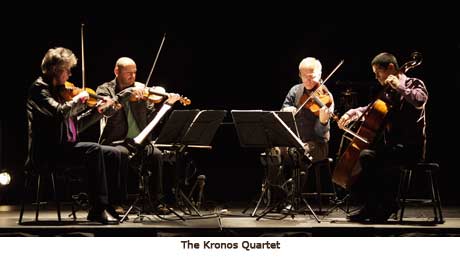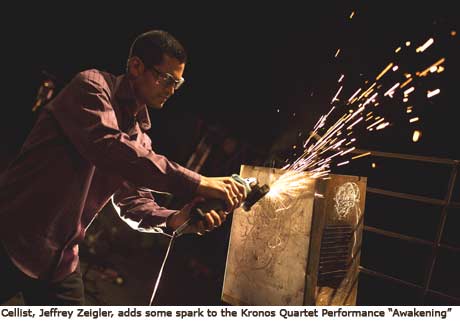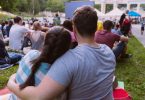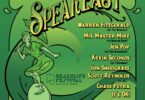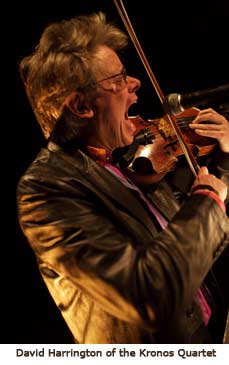
The Kronos Quartet, based in San Francisco, has come to be known as one of the most well rounded group of virtuoso string players in the world. For their performance on Friday, violinists David Harrington and John Sherba, as well as violist Hank Dutt and cellist, Jeffrey Zeigler, collaborated with composers from around the world to bring Los Angeles “Awakening: A Musical Meditation on the Anniversary of 9/11″, a remarkable piece that the Financial Times says “alarms, terrifies, soothes and ultimately proposes a measure of hope”.
In the past I’ve seen Kronos play standard repertoire to stunned audiences across the country, but the concert on October 3rd at Royce hall was even more of a demonstration of the players’ virtuosity. For experts like these players, their instruments become an extension of themselves, and this concert allowed them each to demonstrate their flexibility as musicians. Making unusual repetoire accessible to the unfamiliarized ear is indeed the mark of a virtuoso, and on Friday one could sense the audience losing themselves in the distant lands Kronos presented through their playing.
The prologue to “Awakening” was an Adhans from the Middle East (sung in Turkey, Afghanistan, Saudi Arabia), a traditional Muslim call to prayer. Arranged by the members of Kronos, the music evoked the dispersed voices of worshippers calling their prayers from all corners of a middle-eastern city. We begin to see that the “arrangements” the Kronos came up with are not just musical, they involve intentional ways of performing. By playing the Adhans in a spread apart nature, the musicians better evoke the separated sound of overlapped voices from different areas of the city.
The program soon took off, rocketing us to unfamiliar destinations, the members of the Kronos using their instruments in unfamiliar ways. In the second piece, an example of an Iraqui Choubi, the Kronos evoked a festive style, using the wood of their instruments as a bright drum rolling underneath the music. Suddenly we were not in Royce Hall anymore but walking through a Middle-Eastern marketplace on a morning after a month of rain. In “Spectre” written by Canadian composer, John Oswald, the quartet weaved a haunting tapping under the strains of modal music. The effect evoked a sleeping, prehistoric land being pelted for the first time by cosmic rain. We were transported again with the traditional Iranian Lullaby, arranged by Jacob Garchik. I was lulled into visions of darkness settling over plains of sand, the instruments calling up apparitions in the desert moonlight.
As well as playing their own instruments in an untraditional style, the Kronos also demonstrated their abilities on untraditional instruments. These included world instruments like the Sarangi, a short necked lute from India, as well as some objects that aren’t usually classified as musical. Throughout the night, the members of the Kronos shuffled around the stage playing things like gongs, to thwacking hunks of metal and wood. Cellist, Jefferey Zeigler even got up and used a motorized saw to cut through some plywood – sending sparks twinkling against the sound. The effect of the intentional “clamor” was a layer in music that we don’t often hear – the context in which it lives, where it might have been written or born out of. Usually we hear music in a dark hall, among an audience reluctant to breathe loudly for fear of disturbing the performance. On Friday, the Kronos set the music in the world, a world of war, construction, progress, demise, and the singing of the strings seemed to rise authentically from the white noise of human life.
We ended a on a little more traditional note. With Terry Riley’s “One earth, One People, One Love From Sun Rings”, 2002, we became witness to the globe we were sitting on, a large projected picture of the earth rising onto a screen above the players. And hence, Riley’s music became a sort of a soundtrack to our world floating in space. Next, we zoomed back in and landed in Sweden with a traditional piece of music “A Thousand Thoughts” arranged by the Kronos. Freeing in its beauty, I understand why it was included in the program. It brought us relief, a peaceful scene far from the reaches of war, the singing music a reminder of what this awe inspiring planet can give us.
Throughout the concert, the members of the Kronos quartet brought a certain glimmering awareness to each mark on their score, and I believe awareness was particularly important for what they were doing last Friday. For their October 3rd concert they combined music from countries involved or touched by the tragedy of September 11th, and the musicians payed careful attention to the complexity behind the notes. The tremors of emotion in the playing was distinct, encouraging us all to remember, to be aware, and hopefully to take a step toward change in this all-important time.
UCLAlive routinely brings world-class musicians from all over the world to the stage of Royce Hall. Their upcoming concerts in October include Cameron Carpenter, who the New York Times calls the “Maverick Organist” as well as the Jerusalem Symphony Orchestra. And that is just the beginning. Start here at www.uclalive.org to have a look at the exciting season ahead. UCLAlive only showcases the best ensembles and performers alive today- so you’re safe – whatever you choose, it will surely be phenomenal.


